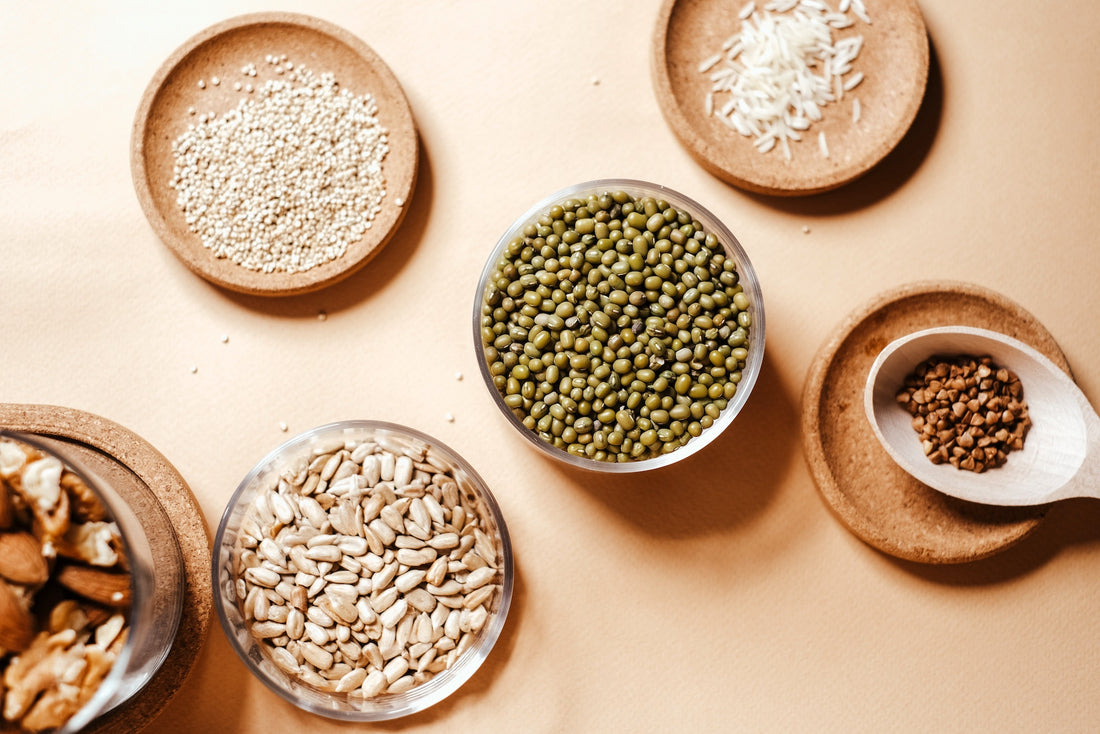
What Plant Based Protein Powder is Best? A Comprehensive Guide
Share
When it comes to choosing a protein powder, the market is flooded with countless options, making it challenging to pick the right one. For those seeking a more sustainable, health-conscious option, plant based protein powders are becoming increasingly popular. But what makes a plant based protein powder the best choice? In this blog post, we will explore the benefits of plant based protein powders, what to look for in a good one, and why opting for a sustainable, organic option matters.
Why Choose Plant Based Protein Powder?
Plant based protein powders offer numerous benefits over traditional whey proteins. Not only do they come with a lower carbon footprint, but they also eliminate concerns associated with dairy proteins, such as hormone content and any allergy issues. Here's why plant based protein powders are a top choice for health-conscious individuals:
- Nutritional Benefits: One of the standout benefits of plant based protein powders is their natural fibre content, which is absent in most animal-based protein powders like whey. Fibre is crucial for digestive health, blood sugar regulation, and achieving a healthy weight. Unlike whey protein, which is purely focused on protein content, plant based proteins often provide an additional boost of fibre from various plant sources.
- Free from Hormones: Unlike whey protein, which can contain HG1 hormones that have been linked to acne flares and other skin issues, plant based protein powders are free from these unwanted hormones. This makes them a safer option for those who are prone to hormonal imbalances or skin conditions.
- Sustainability: Plant based protein powders are derived from crops like peas, brown rice, hemp, and pumpkin seeds. Unlike whey protein, which requires cattle farming—a significant contributor to greenhouse gas emissions—plant based options have a much lower environmental impact. Choosing plant based protein helps reduce deforestation, water usage, and pollution, making it a more sustainable option.
What Makes a Good Plant Based Protein Powder?
To determine the best plant based protein powder, it's essential to consider several factors:
- High-Quality Protein Sources: Look for protein powders that use a combination of plant sources to provide a complete amino acid profile. Some of the best sources include:
- Pea Protein: A great source of iron and provides a complete range of essential amino acids.
- Brown Rice Protein: Easy to digest and contains high levels of BCAAs (branched-chain amino acids), which are crucial for muscle recovery.
- Hemp Protein: Rich in omega-3 and omega-6 fatty acids, hemp protein is an excellent anti-inflammatory option.
- Pumpkin Seed Protein: High in magnesium, zinc, and iron, pumpkin seed protein is another great option for those seeking a nutrient-dense choice.
- It’s advisable to avoid protein powders that rely heavily on soy protein. While soy is a popular choice, it can be highly processed and is often genetically modified. Additionally, some people may have sensitivities to soy or concerns about its oestrogen-mimicking properties.
- Organic and Non-GMO Ingredients: Opting for organic and non-GMO plant based protein powders ensures that you are consuming a product free from harmful pesticides and chemicals. Organic farming practices also support soil health and reduce environmental toxins, adding to the sustainability of the product.
- Minimal Additives and Fillers: A good plant based protein powder should have a clean ingredient list with minimal additives, fillers, or artificial sweeteners. Natural flavours and sweeteners like stevia or monk fruit are preferred over artificial ones like aspartame or sucralose, which can cause digestive discomfort in some people.
- Digestibility and Taste: Some plant based proteins can be gritty or have a strong, earthy flavour. Look for products that undergo minimal processing to retain their natural flavour and texture. Products that blend well and taste good with water, plant milk, or in smoothies are often preferred.
- Sustainable Packaging: An often overlooked but significant aspect is the packaging. The best plant based protein powders come in sustainable packaging options, such as recyclable or compostable materials. This further reduces the environmental footprint of the product.
The Nutritional Benefits of Plant Based Protein
Plant based protein powders are more than just a source of protein; they are nutrient-dense, offering additional health benefits:
- Rich in Fibre: Unlike whey protein, plant based protein powders often contain dietary fibre, which is crucial for digestive health, helps in maintaining healthy blood sugar levels and helps you feel fuller for longer.
- Antioxidants and Phytonutrients: Plant proteins come with a variety of antioxidants and phytonutrients that help in reducing inflammation and combating oxidative stress.
- Good for Heart Health: Plant based proteins are naturally cholesterol-free and low in saturated fat, making them an excellent choice for heart health.
Why Avoid Whey Protein?
While whey protein is a popular choice among athletes and bodybuilders due to its rapid absorption rate, it comes with its own set of drawbacks:
- Contains HG1 Hormones: Whey protein is derived from cow’s milk, which may contain HG1 hormones that can disrupt the body's hormonal balance. This is particularly concerning for individuals prone to hormonal acne or those looking to maintain clear skin.
- Lactose Intolerance Issues: Many people are lactose intolerant or have difficulty digesting dairy. Plant based proteins eliminate this problem entirely.
- Environmental Impact: Whey production involves intensive cattle farming, contributing significantly to greenhouse gas emissions, deforestation, and water pollution. Opting for plant based proteins is a step toward a more sustainable lifestyle.
Choosing the Best Plant Based Protein Powder: Key Takeaways
When deciding on the best plant based protein powder, consider the following:
- Look for high-quality, diverse protein sources like pea, brown rice, hemp, and pumpkin seed.
- Avoid soy-based powders due to potential allergies and the presence of genetically modified organisms (GMOs).
- Opt for organic, non-GMO, and sustainably sourced ingredients.
- Check for minimal additives, good digestibility, and taste.
- Consider the sustainability of the packaging to further reduce your environmental footprint.
Conclusion
Choosing the best plant based protein powder goes beyond just looking at the protein content. It involves considering the quality of ingredients, the environmental impact, and the overall benefits to your health. By opting for a plant based protein powder that is organic, free from harmful additives, and sustainably produced, you are making a choice that benefits not just your body, but also the planet. Whether you're looking to build muscle, recover from workouts, or simply add more protein to your diet, a high-quality plant based protein powder is an excellent, all-rounded choice.
By making the switch to plant based protein, you’re not only supporting your health and wellness goals but also contributing to a more sustainable future.
